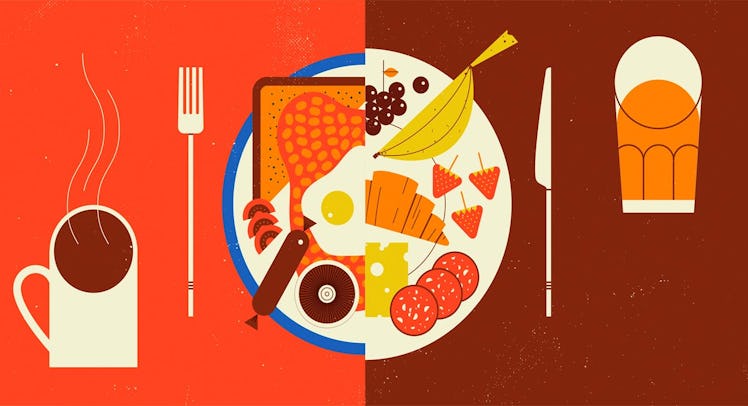The Case Against The Case Against Eating Processed Foods
Author Robert L. Shewfelt debunks the myths behind processed foods, and explains how parents can incorporate them into a healthy diet for the whole family.

Processed foods aren’t getting a lot of love lately. And for parents worried about their families’ eating habits, the question is less whether to cut back on Happy Meals, sugary sodas, and Wonder Bread, and more how to do so. Should parents slap processed food out of their children’s hands or should they just light it on fire? Perhaps it would be best to hide it beneath a pile of quinoa. More nuanced approaches rarely come up and the idea that processed foods might be fine almost never does. But–and, don’t worry, there are gonna be caveats–it might be.
Robert L. Shewfelt’s In Defense Of Processed Food makes the data-driven argument that a healthy diet is less about choosing the right foods and more about choosing the right ingredients. Shewfelt posits that home-cooked meals are just as high in sugar and salt than prepackaged ones. Fatherly caught up with Shewfelt to browbeat him about his eating choices and also, grudgingly, listen to his side of the story.
How did processed food get such a bad rap?
I’m not sure I’ve got a good answer. I guess because we’re looking for a scapegoat for the obesity epidemic, and processed food fits, since there are a lot of processed foods that are not as good for you. I think it’s also that, the people who write these [anti-processed food] books tend to be anti-capitalist, borderline socialist—maybe I shouldn’t say that—but there is a really strong anti-corporation bent out there. And you know, it has some merit, because there are a lot of food corporations that do take advantage of the public, particularly advertising, but I just don’t understand why it’s food that gets the blame.
I guess expecting rationality in these days and times is a little too much to ask for.
As long as we’re talking politics, do you consider this a partisan issue?
I’m not sure I would put that solely on the conservative or liberal end. The conservative end obviously denies global climate change, denies that we need to be concerned about sustainability. As far as the liberals go, they tend to be upset about corporations, and also upset about food processing, food technology, things like that. I’m not sure I could blame either side. One of the things I’m trying to do in the book is have a middle of the road perspective and avoid the extreme.
Scientifically speaking, is there actually anything wrong with processed food?
Sure. Processed foods can be high in sugar and salt. In Mindless Eating, [author] Brian Wansink [of Cornell University] writes that we just eat without thinking and shop without thinking. The whole idea is that, when we select the foods we’re going to buy to prepare at home, we need to be thinking about sugar, salt, calories, rather than the latest trend or whether this particular food is “healthy”. I’m more of a healthy diet person than a “healthy food” person. You don’t make diets out of healthy foods, you try to balance things out. But that doesn’t seem to be a very sexy approach anymore…
If processed foods aren’t what made America fat, what is to blame?
We seem to be in a place where one thing must cause everything, so we have to narrow it down to one factor rather than admit that it’s probably multifactorial. Fat parents are more likely to have fat children. We tend to over-eat, under-exercise, eat the wrong types of foods that are high in calories—plus a bunch of other stuff. There are aspects that can’t just be explained by blaming the food, which is what the pundits do, and blaming the person, which is what Big Food does.
How can I incorporate processed foods into a responsible diet for my family?
Read labels. People focus on the ingredients too much, and not enough on the nutrition facts. You especially need to check the serving sizes. There are a lot of processed foods out there that are too high in sugar or salt, and those can be avoided. But a lot of the foods made at home are also high in sugar and high in sugar and salt. Any time you select a food, it’s a whole bunch of trade-offs: safety, nutrition, sustainability. We tend to focus on one thing, whereas eating is multifactorial. The other thing is portion control. Buy smaller plates. When I was growing up, you ate everything on your plate to save the people in China (not sure how that worked out) but now we eat everything we see, and when we have a full plate we tend to eat more.
How much should I be fighting with my kids over eating healthy?
My mother used to say that it’s always the people who have no children who are the “experts” on parenting, so let me qualify that I have no children but, based on what I’ve read, you shouldn’t come down too hard. If you prohibit stuff, they’re going to find a way to get it, whether in the home or outside the home. They’ll trade their carrots for candy bars. It should be one of those things where you allow some [unhealthy foods], but try to get them to eat other things too. As I understand it, if you force vegetables on kids they reject it. Instead, try taking the children shopping and coming to some sort of mutual agreement as to what they eat. You want them to have healthy diets without forcing them—or having big fights.